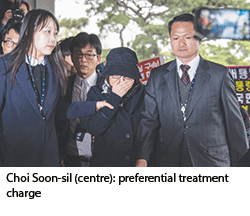 The involvement of a university in a corruption scandal engulfing South Korean politics has highlighted the problems of the country’s hyper-competitive higher education system. In a political scandal currently dominating headlines in the country, Park Guen-hye, the nation’s president, has been accused of being subject to the influence of her confidante Choi Soon-sil.
The involvement of a university in a corruption scandal engulfing South Korean politics has highlighted the problems of the country’s hyper-competitive higher education system. In a political scandal currently dominating headlines in the country, Park Guen-hye, the nation’s president, has been accused of being subject to the influence of her confidante Choi Soon-sil.
Ms. Choi, who has no official position or security clearance, is alleged to have been given access to sensitive information and has been accused of using her position to extort large sums of money from companies for personal gain. Meanwhile, an investigation has found that a prestigious private university gave preferential treatment to Choi’s daughter. Chung Yoo-ra, a member of the national dressage team, enrolled at Ewha Womans University in 2015, soon after the university expanded its list of sports eligible for preferential treatment, to include equestrian sports. Despite minimal attendance and late submissions, Ms. Chung received good marks, following a recently introduced internal regulation favouring the grades of students showing athletic or artistic ability.
The South Korean ministry of education dispatched a team to Ewha and found that Choi’s daughter had been given preferential treatment. It has now demanded that her admission to the university is cancelled. Following protests by students and staff over the allegations that Chung received favourable treatment, Ewha’s president Choi Kyung-hee stepped down, in the first such case in the institution’s 130-year history.
Given the extreme pressure South Korean students face to gain entry to prestigious universities such as Ewha, it’s unsurprising that allegations of admission procedures being manipulated have provoked such anger. “For Korean students and their families, the hyper-competitive university admission process is one of the most crucial issues, which decides later social mobility,” says Dr. Jaeho Kang of the Centre for Korean Studies at London University’s School of African & Oriental Studies. “That’s why the corruption scandal at Ewha Woman’s University (has prompted) shock.”
South Korea’s rigid educational system — in which exam results determine the trajectory of a young person’s life — has rapidly transformed it into one of the best educated countries in the world, but it has its costs. Parents spend hundreds of dollars per month on extra tuition for each child, and the country’s suicide rate — the second highest in the world — has been attributed to this high-pressure system.